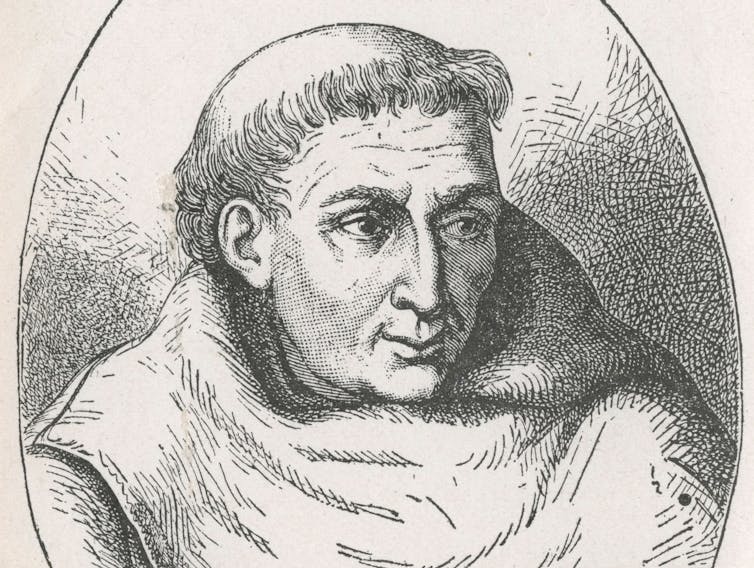
Experts in autocracies have pointed out that it is, unfortunately, easy to slip into normalizing the tyrant, hence it is important to hang on to outrage. These incidents which seem to call for the efforts of the Greek Furies (Erinyes) to come and deal with them will, I hope, help with that. As a reminder, though no one really knows how many there were supposed to be, the three names we have are Alecto, Megaera, and Tisiphone. These roughly translate as “unceasing,” “grudging,” and “vengeful destruction.”
I have been maintaining that we – by which I guess I mean people who are sane – are never going to understand Trump supporters and other RWNJs simply because our brains are wired so differently. By that I don’t necessarily mean hard wired (heredity) but also soft wired by experiences and now pretty well frozen (environment). I think G. K. Chesterton or C. S. Lewis or both might have said something about it not being possible for a normal sized mind to fit into a space which is that small. In any case, it is something which is very visible today because so many of the people with those minds have so much power. But it isn’t a new problem.
(Uh oh, there she goes, she’s going to cite history again.) Yup. May as well. Truth and error have always been with us, so why not look at history for an analysis far enough removed in time that it could possibly help? So, here goes.
================================================================

The ‘first scientist’s’ 800-year-old tonic for what ails us: The truth
Richard Gunderman, Indiana University
It seems that science has been taking a beating lately. From decades of denial by the tobacco industry that smoking causes cancer to more recent attempts to use the COVID-19 pandemic to score political points, a presumption seems to have taken root that it is okay to seek and speak the truth only when it suits personal interest.
In times like these, we urgently need leaders who know what they are talking about and whose commitment to truth exceeds their loyalty to party or person – among them, the sort of people long known as scientists (“those who know,” the literal meaning of scientist). COVID-19 is a kind of plague, but so is ignorance, and only by addressing the latter can society tackle the former.
This year marks what is believed by many to be the 800th birthday of an especially courageous truth seeker, the English polymath Roger Bacon. Though other scientists came before him, his breadth of study has led many to call him “the first scientist.” Were he alive today, Bacon would likely be pursuing the truth about such matters as the coronavirus and its effects on society, as well as the need for personal and political virtues to overcome it.
Roger Bacon’s pursuit of the truth
Because Bacon lived so long ago, we know more about his ideas than his life. Born in Somerset, England, his family appears to have been well off, and he studied and taught at two of Europe’s oldest universities, beginning at Oxford. After earning his master of arts degree, he accepted an invitation to teach at the University of Paris for about a decade before eventually returning to Oxford.
Bacon was one of those remarkable human beings who seem to know just about everything. An expert on the thought of the ancient philosopher Aristotle, he also taught mathematics, astronomy, music, optics, alchemy (a forerunner of chemistry), moral philosophy and theology. Because of the depth and breadth of learning reflected in his Opus Majus (“Great Work”), composed at the Pope’s request to describe his studies, he became known as Doctor Mirabilis or “Wonderful Teacher.”

Bacon believed that the improvement of human life, both personally and socially, depends on the eradication of error. To correct what ails society, it is necessary to restore respect for learning, real-world experience and the pursuit of truth. So long as people go forth with a false map of reality, they will lose their way and never reach their true destination.
The importance of the right question
Bacon argued that there are four causes of error: 1) weak and unworthy authority, 2) longstanding customs, 3) the opinions of ignorant crowds, and 4) the hiding of ignorance through displays of apparent knowledge.
What people often lack, Bacon believed, are not correct answers but the best questions. To advance knowledge, people must subject authorities to scrutiny, winnowing away the unreliable. Who is speaking the truth, and on what basis, and who is merely mouthing what people want to hear?
In Bacon’s view, too many people lapse into a credulity of habit, simply accepting what they have been told over and over. To combat this tendency, he called for experimentation, but not only in the sense of a scientific laboratory. He believed that people should put their ideas on trial, seeing how well they fare when tested in the real world of experience. What doesn’t hold up should be rejected.
Bacon gave the example of fire, writing, “Reasoning draws a conclusion and makes us grant the conclusion, but does not make the conclusion certain, nor does it remove doubt so that the mind may rest on the intuition of truth, unless the mind discovers it by the path of experience.” Only someone who actually sees fire burn will understand what it can do.
Without proper habits of mind, Bacon argued, society would be mired in ignorance and failure. Only if institutions of learning such as universities fulfill their proper function can society find and stick to its proper course. And all persons, he believed, have both the capacity and the responsibility to think for themselves and keep their community on track.
Bacon expressed deep antipathy toward those who merely pretend to know, such as magicians who pretend to use scientific methods. Princeton philosopher Harry Frankfurt more recently referred to such pretenders as “bullshitters.” Ignorance is bad, but pretending to know is even worse, because it undermines trust.
On ignorance and corruption
Bacon treated ignorance so harshly partly because he saw that it sowed the seeds of corruption.
Extrapolating from Bacon, regular scrutiny is necessary if political leaders are to act responsibly. The last thing any good political leader needs is to be surrounded by yes men. It is through the contest between differing points of view that people are most likely to arrive at the truth.
This perspective helps to explain both Bacon’s promotion of the science he called “perspective” and his lifelong dedication to the study of languages such as Greek and Hebrew. To determine the best perspective from which to understand something, it is first necessary to look at it from multiple points of view.
Above all, Bacon promoted humility. People must seek to know the truth and cling to what they have proved by experience to be valid. But they must also recognize the limits of their own knowledge, seek out the advice of experts, and pursue deeper understanding.
This was Bacon’s life’s work. “No one,” he wrote, “worked in so many sciences and languages as I did, nor so much as I. And yet I did not work that much, since in the pursuit of wisdom no work” – of the sort one might resent – “was required.”
Like Aristotle, he believed that it is human nature to desire to know. There is, he held, nothing more natural and also more necessary and beneficial to humanity than pursuing the truth.
This article has been updated to remove a quote that cannot be confirmed as Roger Bacon’s.
[You need to understand the coronavirus pandemic, and we can help. Read The Conversation’s newsletter.]![]()
Richard Gunderman, Chancellor’s Professor of Medicine, Liberal Arts, and Philanthropy, Indiana University
This article is republished from The Conversation under a Creative Commons license. Read the original article.
================================================================
This, in my opinion, presents a very good attitude to maintain about truth and untruth in general. Unfortunately, it does not answer the question of how to you deal with, work with, relate with people who don’t get it that fire burns, even after having seen and lived through it. And that’s what we all want to know.
Alecto, Megaera, and Tisiphone, even the much maligned St. Paul said “Prove [test] all things, hold fast that which is good.” I Thess 5:21 Is this the first appearance in history of the scientific method? Probably not. But don’t we all wish we could get the Branch Covidians to read, understand, and practice THAT verse, instead of all the ones they think they know which don’t in fact exist?
11 Responses to “Everyday Erinyes #213”
Sorry, the comment form is closed at this time.

She who knows and knows that she knows is a wise Democrat. Elect her.
He who knows not and knows that he knows not is ignorant. Teach him.
He who knows and knows not that he knows lacks esteem. Build him up.
He who knows not and knows not that he knows not is a fool. Avoid him.
He who knows not whether or not he knows or knows not something or nothing about anything at all is a Republican sheeple. Pity him.
He who knows, but says that he knows not, or knows not, but says that he knows is a Republican politician. Flush him!
Good one JD!
Thanks. She who knows and knows that she knows may also be a wise blog editor … like Lona – whose newest post I missed in my weekly email.
To find it, click on Previous Post at the bottom of this page, or go here.
Wonderful posting!
Aprops of the “Bullshit” comment in the article, Carl Sagan referred to his “Bullshit detector,” in his wonderful book, “The Demon Haunted World, Science As a Candle in the Dark.”
TC, your aphorisms rock!
I’m going to be a bad boy, and send the link to the original article to my stupid cousin, with a comment about being Gaslighted by Faux News. I’ve seen some wonderful articles by “The Conversation.”
Everyone has a bullshit detector, but not everyone’s works equally well, and some just never use it. Sigh.
Thanks Joanne–my exposure to Bacon was more in pieces as a part of the context for others, so I welcomed seeing him more as a standalone here.
I’ve heard it said that real learning begins once you’ve covered enough to get to the point of realizing how much you do not know. All too many these days seem to stop before they ever reach that point.
You outdo yourself each week by your educational posts, Joanne.
Great comments too, btw.
Excellent post, Joanne (and Furies). Thank you!
Aren’t you glad I used it as part of a series, so that I didn’t have to use a title including “Six Degrees”?
Joanne, you really did a superb job with this posting.
I really enjoyed reading about Roger Bacon.
Sure wish he was around today, with all of the political garbage we have thrown at us daily,
Thanks again, Joanne
Wow, those four causes of error are now combined in one person that I need not name.
Bacon was ahead of his time but his faith in the capabilities of mankind seems not to have withstood the test of time: “all persons, he believed, have both the capacity and the responsibility to think for themselves and keep their community on track”. Of course, Bacon is right about this but at the moment large groups of people are very capable of hiding that capacity.
Yes. Notice he did not say that all persons have the will. Without the will, capacity and responsibility will not go very far. I’m pretty sure he knew that.